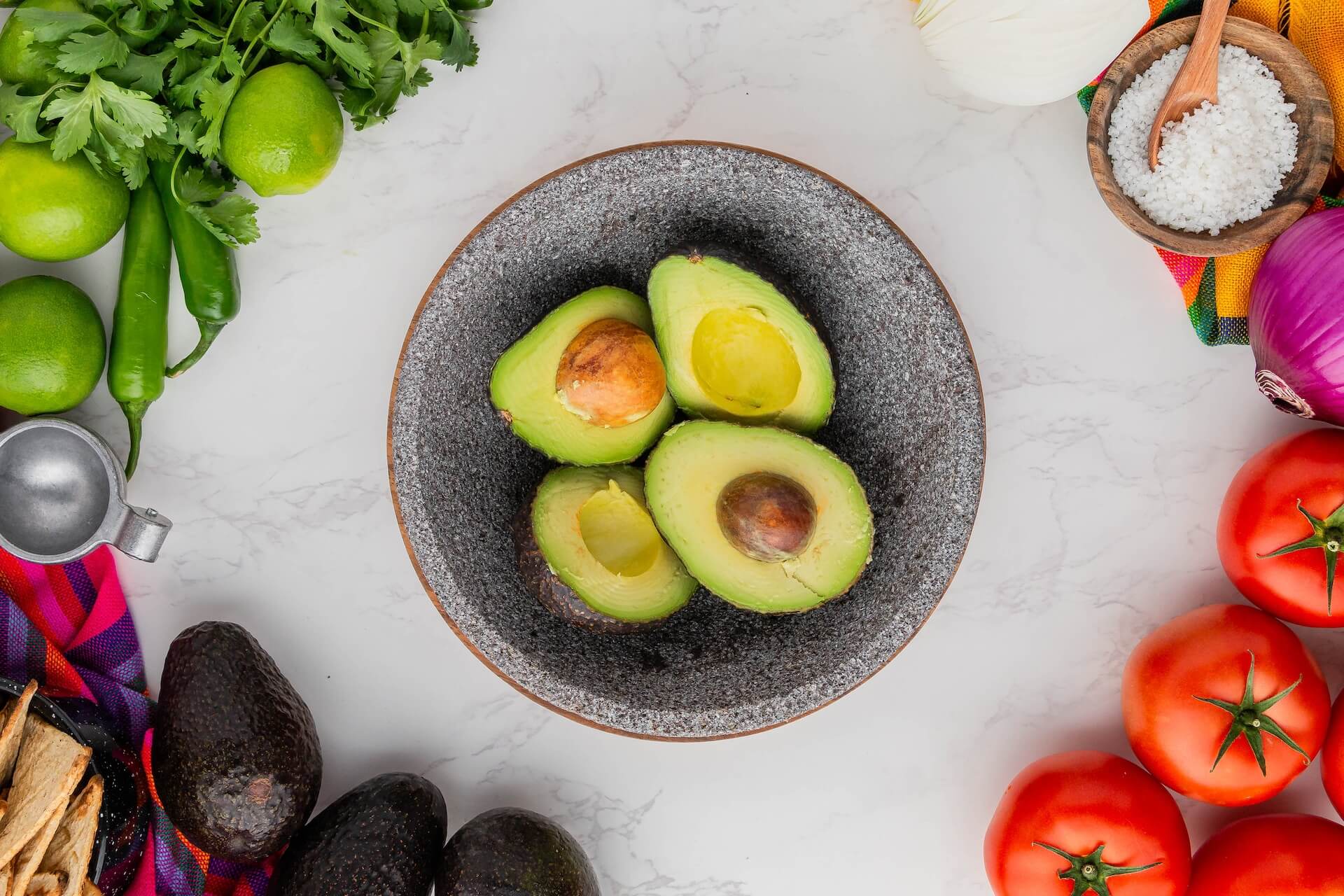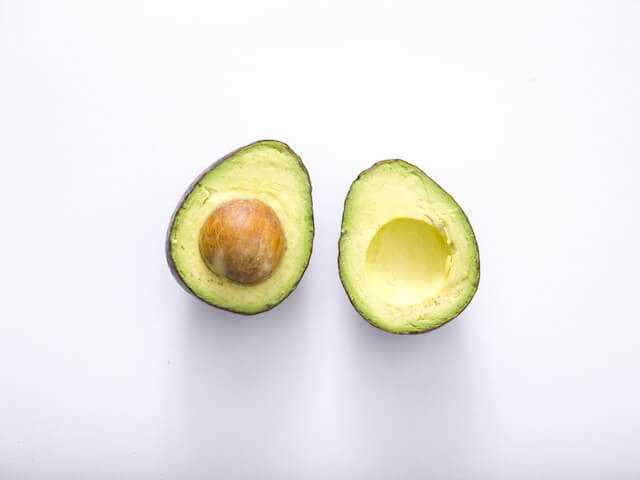Avocado Glycemic Index: Health Benefits

Avocados, or “alligator pears,” are often considered healthy and nutritious, especially since they are rich in nutrients and healthy fats. They also are extremely popular in many cultures and are known as the featured ingredient in guacamole.
Glycemic Index Table
Avocados have a low glycemic index (GI) of 40. Low glycemic index foods are less likely to cause blood glucose spikes. Also, several epidemiological studies have found that replacing saturated fats with unsaturated fats, like avocados, can improve insulin resistance and reduce the risk of type 2 diabetes.¹
Glycemic Index
40
Serving Size
100g
Carbohydrate* per Serving (g)
8.52 g
GL per Serving
3.00

Nutritional Facts
Avocados are a great source of fiber and contain more fats than carbohydrates, which makes them extremely popular for people following a low-carb-eating-style. Avocados are also among the highest-fat plant foods, which is why they are included in many vegan and vegetarian diets. The neutral but earthy flavor of avocado allows it to work well in sauces, salad dressings, sandwiches, salads, and more.
The nutritional facts below are based on a 100g serving of avocado, approximately one-half of a medium avocado.
Calories
160 kcal
Carbs
8.52 g
Protein
2 g
Fiber
6.7 g
Cholesterol
0 mg
Vitamins
C (10 mg), E (2.07 mg, K (21 μg), Folate (81 μg)
Sodium
7 mg
Total Fat
14.7 g
Is Avocado Good for Weight Loss?
Avocados can be helpful with both weight loss and weight management. As noted above, avocados are rich in anti-inflammatory properties, improve digestion, and reduce the risk of obesity. Also, they contain less than one gram of sugar, so you can enjoy avocados without losing sight of your wellness goals.
Studies have also shown that avocados can help individuals lose weight by reducing hunger, improving satiety, and raising metabolic rates.⁶
Avocados are also a good source of fiber, which promotes feelings of fullness, slows down digestion, and can help with regular blood sugar levels. These benefits can also assist with appetite control and overall weight loss goals.
When eating avocados, pay particular attention to portion size. A single avocado (about 150 to 200 grams) can contain up to 300 calories.
Is Avocado Safe for People Living with Diabetes?
People living with diabetes can certainly eat avocados! Avocados are a low glycemic food, meaning they will not cause high blood sugar spikes. They are also low in carbohydrates and have a high fiber content, which can help regulate blood glucose levels.
Avocados also boost insulin sensitivity, which is common in people living with type 2 diabetes. Avocados help increase insulin action in the body, lowering blood glucose levels.
It is always important to be mindful of portion sizes. While avocados contain many benefits, they do contain a high amount of calories and fat.
Allergies
Avocado allergies are not common but are often found in individuals allergic to birch pollen and/or latex.
Symptoms of an allergic reaction include itchy mouth, lips, throat, lip swelling, sneezing, nausea, and a possible anaphylactic reaction. Speak to your healthcare provider if you believe you experience an allergic reaction to avocados to determine possible next steps.

FAQs
The glycemic index (GI) is a measure of how quickly a carbohydrate-containing food raises blood sugar levels compared to a reference food, usually glucose. It ranks foods on a scale from 0 to 100, with higher values indicating a faster rise in blood sugar. The glycemic index (GI) scale is typically categorized as follows: Low GI [55 or less], Medium GI [56-69], High GI [70 or higher]. Foods with a high glycemic index digest rapidly and can cause dramatic fluctuations in blood glucose or glucose spikes.
Glycemic load (GL) takes into account both the quality (glycemic index) and quantity (carbohydrate content) of carbohydrates in a specific serving of food. It is a measure of how much a particular food will raise blood sugar levels. GL is calculated by multiplying the glycemic index of a food by its carbohydrate content and dividing it by 100. It provides a more accurate representation of the overall impact of a food on blood sugar compared to the glycemic index alone.
Avocado has a low glycemic index and does not cause a significant spike in insulin levels. It is a good source of healthy fats and fiber, which can help regulate blood sugar levels and improve insulin sensitivity. However, it is important to consume avocado in moderation as it is high in calories.
Yes, avocado is considered a low glycemic food. It has a glycemic index (GI) of 40, which is considered very low. This means that it has a minimal impact on blood sugar levels and can be a good choice for people with diabetes or those looking to manage their blood sugar levels. Additionally, avocados are high in healthy fats and fiber, which can help slow down the absorption of carbohydrates and further reduce their impact on blood sugar levels.
Yes, people living with diabetes can eat avocado in moderation as it is a low-carbohydrate fruit that is high in healthy fats and fiber. Avocado has a low glycemic index, which means it does not cause a rapid increase in blood sugar levels. However, it is important for diabetics to monitor their portion sizes and overall carbohydrate intake to maintain healthy blood sugar levels.
References
- Risérus U, Willett WC, Hu FB. Dietary fats and prevention of type 2 diabetes. Progress in lipid research. 2009 Jan 1;48(1):44-51.
- Schoeneck M, Iggman D. The effects of foods on LDL cholesterol levels: A systematic review of the accumulated evidence from systematic reviews and meta-analyses of randomized controlled trials. Nutrition, Metabolism and Cardiovascular Diseases. 2021 May 6;31(5):1325-38.
- Lichtenstein AH, Deckelbaum RJ. Stanol/sterol ester–containing foods and blood cholesterol levels: a statement for healthcare professionals from the nutrition committee of the council on nutrition, physical activity, and metabolism of the American Heart Association. Circulation. 2001 Feb 27;103(8):1177-9
- Wu J, Cho E, Willett WC, Sastry SM, Schaumberg DA. Intakes of lutein, zeaxanthin, and other carotenoids and age-related macular degeneration during 2 decades of prospective follow-up. JAMA ophthalmology. 2015 Dec 1;133(12):1415-24.
- Bhuyan DJ, Alsherbiny MA, Perera S, Low M, Basu A, Devi OA, Barooah MS, Li CG, Papoutsis K. The odyssey of bioactive compounds in avocado (Persea americana) and their health benefits. Antioxidants. 2019 Oct;8(10):426.
- https://www.ncbi.nlm.nih.gov/pmc/articles/PMC6471050/



























